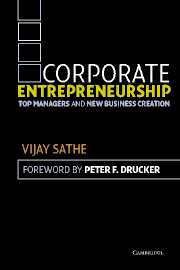Book contents
- Frontmatter
- Contents
- List of figures
- List of tables
- Foreword
- Preface
- List of abbreviations
- 1 Introduction
- 2 Why a consistent emphasis and approach for new business creation is beneficial but difficult to achieve
- I The business environment
- II The management culture
- 5 Shared beliefs about rewards, risks, opportunities, and rule-bending
- 6 Shared beliefs about control and learning
- III The corporate executives
- IV The division general manager
- V The division and its top management team
- VI Putting it all together
- Notes
- Bibliography
- Index
6 - Shared beliefs about control and learning
Published online by Cambridge University Press: 22 September 2009
- Frontmatter
- Contents
- List of figures
- List of tables
- Foreword
- Preface
- List of abbreviations
- 1 Introduction
- 2 Why a consistent emphasis and approach for new business creation is beneficial but difficult to achieve
- I The business environment
- II The management culture
- 5 Shared beliefs about rewards, risks, opportunities, and rule-bending
- 6 Shared beliefs about control and learning
- III The corporate executives
- IV The division general manager
- V The division and its top management team
- VI Putting it all together
- Notes
- Bibliography
- Index
Summary
This chapter examines how the shared beliefs about control and learning influence new business creation (Table 6.1).
Many people believe that control is the antithesis of entrepreneurship and new business creation. Yet, contrary to popular belief, managers in companies with long track records of successful new business creation believe that appropriate control is the essential companion of entrepreneurship.
Controls to test business convictions help new business creation
Managers in companies with less experience in new business creation share the belief that the purpose of control is to enable corporate executives to make decisions regarding specific initiatives in the division, which de-motivates division managers and hurts new business creation. Greg Gibbons talked about how corporate interference had stifled new business creation at Xerox OPD before he took over as DGM:
We had this incredibly bureaucratic system whereby the corporate committees and the corporate staff would evaluate everything the operating units did, and would slow the entire process down. And the corporate people were basically making the decision whether or not a division would move ahead on this strategy or bring that product to the marketplace.
In sharp contrast, managers in companies with successful track records of new business creation share the belief that the purpose of control is to test the business convictions of those engaged in new business creation.
- Type
- Chapter
- Information
- Corporate EntrepreneurshipTop Managers and New Business Creation, pp. 80 - 90Publisher: Cambridge University PressPrint publication year: 2003



